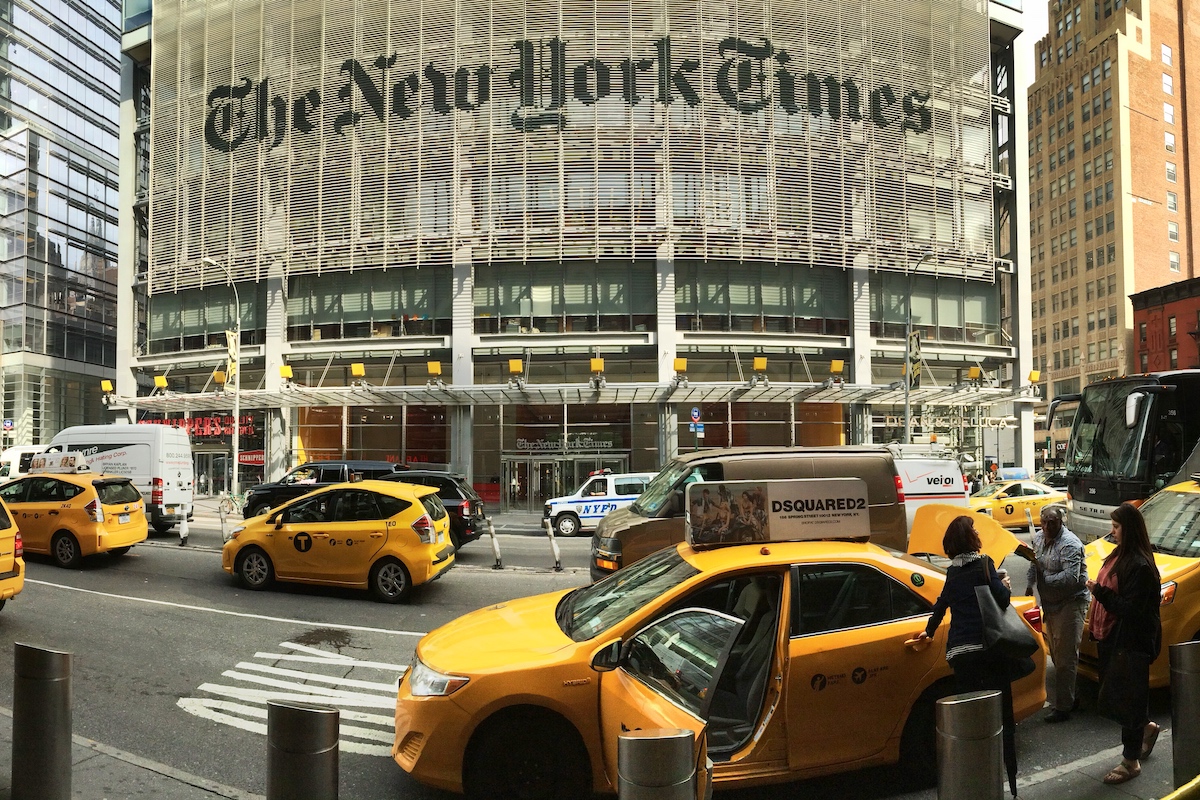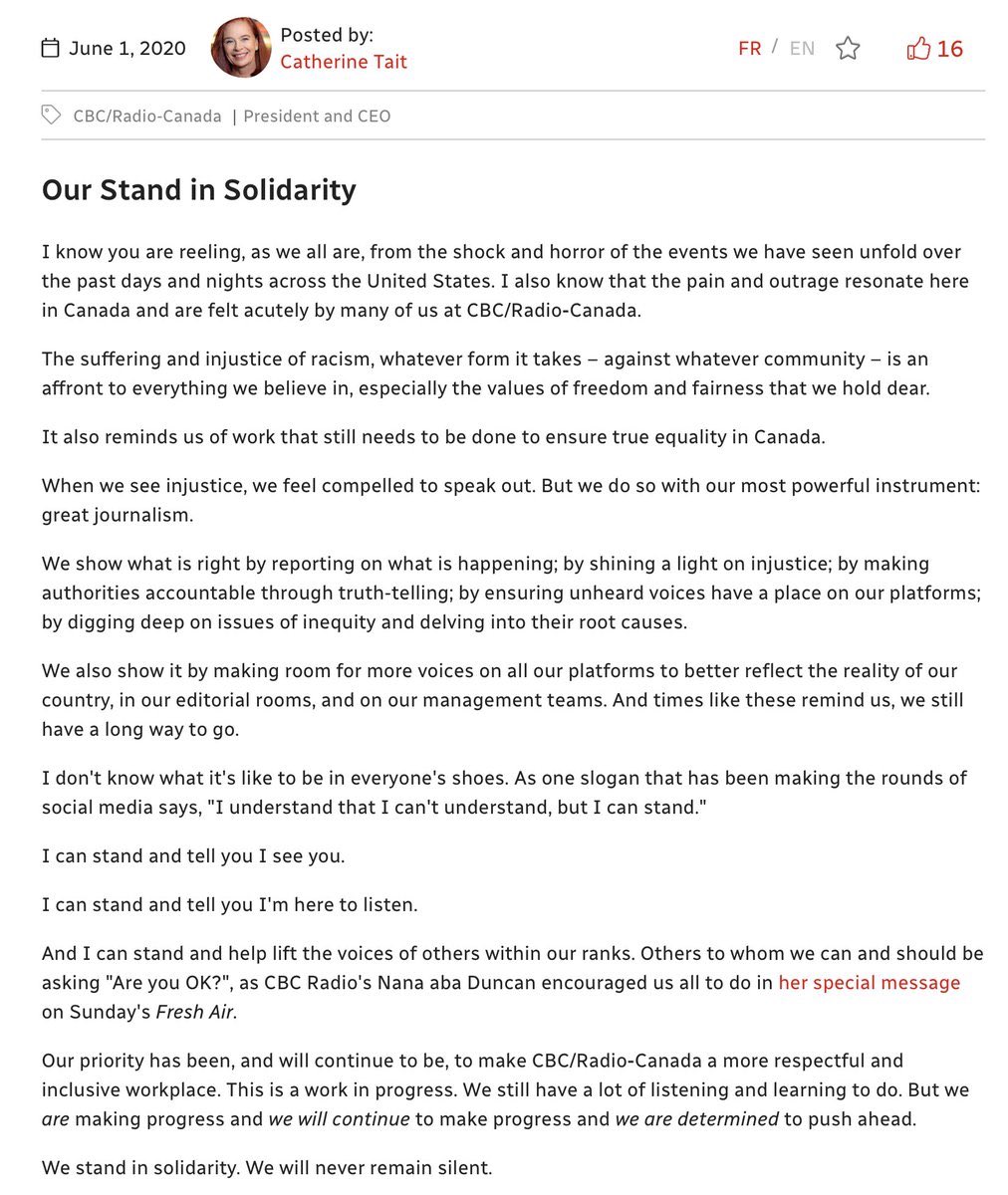Editorial
For Journalists, The New York Times' Social-Justice Meltdown Is a Sign of Things to Come
If you want to get a glimpse into the future of journalism—not to mention poetry, music, fiction, and all the rest—these tempests offer a good taste of what’s to come.

On Sunday, two weeks following the shocking killing of George Floyd by a Minneapolis police officer, the city’s leaders pledged to overhaul their entire municipal police department. The move could mark the beginning of a law-enforcement reform movement across the whole United States. This is a welcome phenomenon. Even conservative public figures such as Mitt Romney and George W. Bush are telling America that it’s time for change.
Yet it’s not just America’s police forces that have come under attack. One notable aspect of the response to Floyd’s death is that many of the institutions being assailed most scathingly are charities, media companies, museums, and arts organizations that have no direct connection to the issue of law enforcement. This includes the Poetry Foundation, a Chicago-based 501(c)(3) organization that was established two decades ago by a wealthy heiress to a pharmaceutical fortune.
The Poetry Foundation and POETRY magazine stand in solidarity with the Black community, and denounce injustice and systemic racism.
— Poetry Foundation (@PoetryFound) June 3, 2020
Read our full statement here: https://t.co/qqbiqEn9UZ
While the foundation is well-known in poetry circles thanks to its magazine and blog, it’s difficult to imagine any subcultural silo more insulated from issues connected to street violence and police brutality. And yet, in an open letter signed by former awardees and contributors, the foundation stands accused of perpetuating “harm, exploitation [and] even trauma” against “people of color, disabled people, trans people, queer people and immigrants.” On June 3rd, the foundation had issued a solemn public statement announcing “solidarity with the Black community.” Ironically, it was the alleged inadequacy of this very statement that caused manifesto signatories to demand the resignation of both the foundation’s president and the chair of its board of trustees, as well as “a meaningful, well-researched acknowledgment of the debt that the Foundation owes to Black poets, [including] a specific acknowledgment of the harm done in recent years to Latinx poets, trans poets, disabled poets, and queer poets.”
“Until these demands are met,” the signatories warned readers, “we will not be submitting any [poems] to the magazine.” The specified deadline is “one week following receipt of this letter.” I don’t want to alarm anyone, but that’s tomorrow.
These poets’ complaints seem too far-fetched to warrant concern—especially given the ludicrous (and even insulting) suggestion that the real life-and-death issues of police brutality endured by the black community should be spoken of in the same breath as the imaginary “harm, exploitation [and] even trauma” experienced by poets who feel ideologically at odds with a white-shoe charity. But in its general form, the dust-up exemplifies a larger pattern of conflict that will continue to embroil all manner of arts, literary, and cultural institutions.
On the same day that the Poetry Foundation published its denunciation of racism, the opinion section of the New York Times published an op-ed by a Republican senator, Tom Cotton, advocating the use of military troops to defend American cities from looting and riots. The piece remains on the Times website, yet now has been tagged prominently with an “editors’ note” explaining why it supposedly didn’t meet the newspaper’s lofty standards. (This is the very same Times opinion section, I might add, that, just two days later, published an op-ed instructing white people to socially excommunicate “relatives and loved ones” who refuse to attend protests or donate money to black causes.) Over the weekend, the responsible section editor, James Bennett, resigned his job. And the Times coverage of his removal plays up the idea of “a significant breakdown in our editing processes.” But the only reason anyone in management cared about this alleged “breakdown” is that prominent Times writers used their public Twitter accounts and corporate messaging channels to attack Cotton’s piece and the Times decision to run it, with some claiming that its appearance put them in “danger.”
What made the Times‘ surrender to its own in-house cancel chorus especially disappointing is that Cotton’s piece hadn’t even argued for a particularly radical position. Survey data collected on May 31st and June 1st, two days before Cotton’s piece appeared on the Times site, suggested that a majority of American adults—including 41 percent of self-described “liberal” survey respondents—supported “calling in the US military to supplement city police forces.” This included 37 percent of black respondents. (Among black respondents aged 45 or higher, the figure was 48 percent.) So it’s not as if Bennett’s section had published excerpts from Mein Kampf under the headline, “Hallowed Words For Troubled Times.”
More shocking still is that the Times gratuitously shamed Bennett’s department by publicly disclosing one-on-one internal messages, right down to what emoji had been used (“a frowning face”) by editor Adam Rubenstein during a Slack conversation with the photo department. And Bennett’s replacement at the Times wasted no time in telling colleagues that snitch culture would be institutionalized under her watch: “Anyone who sees any piece of Opinion journalism, headlines, social posts, photos—you name it—that gives you the slightest pause, please call or text me immediately.” As Andrew Sullivan quipped, “If you’re not chilled by a NYT editor urging staffers to report each other for wrongthink, you don’t know history.”
“Anyone who sees any piece of Opinion journalism, headlines,social posts,photos—you name it—that gives you the slightest pause, please call or text me immediately.”
— Andrew Sullivan (@sullydish) June 8, 2020
If you're not chilled by a NYT editor urging staffers to report each other for wrongthink, you don't know history.
The United States was rightly shaken by George Floyd’s killing, which prosecutors describe as murder. It’s understandable that newsroom staffers would become swept up in a national movement to signal their solidarity with the cause of racial justice. And maybe it was predictable that managers would feel pressured to surrender to these activist tendencies rather than imperil their own careers by defending the stodgy idea of editorial integrity. But there has to be something larger at play here—because similar scenes of moral panic now are on display in other English-speaking countries where levels of violent crime and police brutality aren’t remotely comparable to conditions in the United States.
In the United Kingdom, for instance, a journalist was forced to step down from judging a book prize after he’d pointed out the (perfectly obvious) contradiction between public-health officials’ demands that people avoid large groups while also permitting massive weekend protests. And a radio presenter who questioned the idea of “white privilege” while saying that “all lives matter” was suspended from his job. In Canada, meanwhile, the president of the Canadian Broadcasting Corporation (CBC), a woman named Catherine Tait, felt compelled to publish a lengthy document—Our Stand in Solidarity—in which she described the entire CBC as existing in a state of paralyzed emotional devastation. Since Minneapolis is not a Canadian city, it all seemed completely over the top (especially given her inclusion of vapid but dramatic-seeming one-sentence paragraphs meant to communicate an attitude of steely moral resolve—“I can stand and tell you I see you,” “I can stand and tell you I’m here to listen,” etc.) Yet when a Toronto-based gossip site started publishing internal CBC messages criticizing Our Stand in Solidarity, it became clear that certain staffers—far from being mortified by their president’s maudlin theatrics—actually found them inadequate. And so two days later, Tait produced a second manifesto, this one indicating to staff that she was “truly sorry” for the deficiencies of the first. For all I know, senior CBC officials, most of them comfortably sequestered at lakeside cottages north of Toronto, are hard at work on a third.

For black residents of Minneapolis and other American communities, racism is a life-and-death matter. But for more privileged individuals such as Tait, as Glenn Loury told the Quillette podcast recently, the anti-racism movement is now more akin to a performative religion, presenting garment-rending adherents with concepts analogous to original sin (whiteness) and excommunication (cancelation). America and its white inhabitants are presented as having permanently cursed souls, a defect that can be addressed only through elaborate rites of penance, as in recent scenes of white people washing the feet of black community leaders. And it’s notable that the above-described art-house and newsroom controversies always seem to originate in some supposedly sacrilegious text or monologue, whose heretical nature is taken as proof of a contaminated character.
The real roots of black suffering in America don’t lie just with racism, but also with an unconscionably inadequate social-safety net, underfunded schools, self-interested police unions that protect bad officers, a disastrous war on drugs, and a prison-industrial complex whose profiteers feast on human misery. These are massively complicated problems that can’t be addressed with new-age religious ceremonies or self-lacerating Facebook posts from preening white suburbanites. Nor will a single black person be helped by privileged culture workers in Toronto, New York, London, Chicago, and Los Angeles leveraging George Floyd’s martyrdom to boost their social-justice bona fides or prosecute pre-existing professional feuds.
* * *
There’s a reason why it’s poets, writers, and editors who’ve gone into cancel-culture beast mode over the last week, and not, say, carpenters and plumbers. Unlike a table or a sink, the things we wordsmiths sell—political postures, controversial opinions, artistic styles, insights, purported moral truths—have no set value. Sometimes we publish things that get declared “stunning and brave,” while a colleague’s very similar offerings sink quickly into obscurity. Or vice versa. In the pre-social-media age, readers typically consumed our writings privately, often through longstanding print subscriptions. But that has now changed: The materials we write, read, edit, and publish act as personal brand signifiers whose moral value fluctuates wildly on the daily stock markets known as Twitter and Facebook. Even at the best of times, it’s an unstable system—because a single bad tweet can set off the equivalent of a bank run. So the temptation is always there to hype your own stock, or downgrade someone else’s, as a means to rally followers and punish enemies.
The reason the Times has lost its editorial moorings isn’t that social media is crazy and tribalistic. Social media has always been crazy and tribalistic. What’s changed is that the firewall between social media and real life has now broken down completely thanks to the pandemic lockdown. Since we’re all working from home, and dealing with co-workers only through digital means, the line between colleague and troll has blurred to nothingness.

It was one thing when Times staffers had to co-exist in a world of cubicles, water fountains, lunchrooms, and elevator chit chat. We all say we’re exasperated by office life, but the annoying rituals of communal work help remind us that our colleagues are actual human beings who tell stories about their dogs and put stick-it notes on their Tupperware. Canceling James Bennet, Real Human Being, would have been a lot harder than canceling @James_Bennet, the Slack-channel avatar. Certainly, it’s no coincidence that the Times’ descent into full-blown progressive cancel-culture social panic happened to coincide with the only period in the newspaper’s history when people who once rubbed elbows daily suddenly never saw each other for many months—just as it’s no coincidence that the editor of Bon Appetit magazine now has been forced to resign because of a Halloween photo from 17 years ago—that people already knew about.
The Bennett saga has gotten a lot of attention because the Times is one of the world’s most famous and influential newspapers. But the same thing is happening at other, less esteemed publications. Last week, Variety magazine tweeted out a story entitled Reflecting Diverse Voices Starts in the Newsroom, by editor-in-chief Claudia Eller. Following on the above-described standard playbook, alleged deficiencies in Eller’s doctrinaire anti-racist attestations were seized upon by critics, including an entertainment writer with whom Eller had apparently locked horns in the past. “No, @Variety_Claudia, you haven’t done enough, and nor have most other [editors-in-chief],” tweeted Piya Sinha-Roy. “I remember speaking with you… years ago about the lack of diversity in your newsroom. [People of colour] voices are constantly dismissed. We are not here to make you look better. We are here to work.”
It was obvious that the two had pre-existing issues arising from their work at competing publications, and Eller clearly resented Sinha-Roy weaponizing her mea culpa to refight old battles. And so she tweeted back, “When someone cops to something why would you try to criticize them? You sound really bitter.” Needless to say, critics then took this bristling response as its own form of racial wrongthink. (“Calling a person of color bitter for speaking openly about their experience? Not a great look,” sniped a Vulture reporter, clearly signaling his own correct-think in the process.) And when the dust settled, Eller was forced to take a two-month administrative leave.
Editors are now in a no-win situation: They need to take a knee to signal their guilt and enlightened attitude—but as soon as they do so, every syllable of their confession becomes a jumping off point for fresh indictments. At the Poetry Foundation, for instance, the patently absurd claims about poets experiencing “trauma” induced the chairman—one Willard Bunn III—to “accept the criticism humbly.” Indeed, Chairman Bunn pronounced himself “grateful for the opportunity to do better.”
This thank-you-sir-may-I-have-another attitude makes it difficult for opponents of cancel culture to even muster a defence of besieged individuals, since those individuals often end up confessing to their crimes before the cavalry can arrive. At the CBC, for example, an outstanding veteran journalist named Wendy Mesley has been thrown out of a hosting gig this week because, during an editorial meeting, she used the n-word to quote something that a prospective panelist had actually said. As someone who knows and admires Mesley, I tried to raise the hue and cry on social media, but I have every expectation that she’ll have been forced to submit to a CBC struggle session before this piece makes it to press.

The normalization of shaming and callouts within organizations typically is justified on the conceit that, to quote Chairman Bunn, it’s all in the service of “dismantling white supremacy.” But of course, the phenomenon has far more to do with politics and score-settling than actual anti-racism. The ultra-progressive young staffers who’ve been recruited by these institutions in recent years are now so collectively powerful that they can mob their own bosses from within without fear of pushback from conservatives (since there aren’t any left). In regard to Don Share, the besieged editor of Poetry magazine since 2013, for instance, one poet told me that Share’s position is “hopeless” precisely because he’s been methodical about giving the insurgents everything they’d ever previously asked for: He’s “pursued a profoundly accommodationist policy toward… the diverse and the woke. Almost every poem [the magazine] publishes is anti-racist and inclusive. The response from the community Share has tried so goddamn hard to woo? A hostile takeover. And because Share has successfully frozen out almost all other ‘non-diverse’ voices that traditionally published in [his] magazine, the signatories have him over a barrel.”
If you want to get a glimpse into the future of journalism—not to mention poetry, music, fiction, and all the rest—these tempests offer a good taste of what’s to come. We’re going to spend more time at home, invest less trust in our peers, and increasingly leverage the mob power of social media to prosecute petty disputes, even as we cynically dilute the very real idea of racism into a meaningless prop.
On the plus side, there’s really never been a better time to think about a career in plumbing or carpentry.






